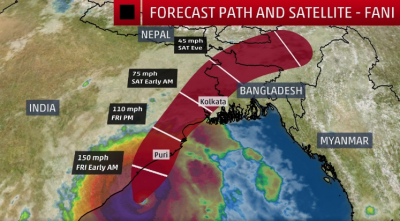The Cyclonic storm ‘Fani’ 02/05/2019 – Posted in: Daily News
The Cyclonic storm ‘Fani’
For: Preliminary
Topics covered: Cyclone, Weaker & Powerful cyclone, Naming of cyclone, Winds, NCMC
News Flash
A powerful cyclonic storm named Fani (pronounced Foni) is headed towards the Odisha coast. Fani cyclone developed in southeast of Sri Lanka about a week ago.
Cyclones emerging over Bay of Bengal in April-May are usually weaker, and often swerve away from India’s east coast.
Tropical Cyclone
A tropical cyclone is a storm system characterized by a large low-pressure center, a closed low-level circulation and a spiral arrangement of numerous thunderstorms that produce strong winds and heavy rainfall.
The months of April and May just before the start of the monsoon, and then October to December immediately after the end of the monsoon, are the prime seasons for tropical cyclones.
Cyclone Naming
The name for this cyclone was suggested by Bangladesh. The World Meteorological Organisation (WMO) has devised a mechanism where countries submit a list of names from time to time. Names of cyclones are chosen from this pool.
For tropical cyclones developing in the North Indian Ocean, countries like India, Sri Lanka, Bangladesh, Maldives, Myanmar, Oman, Pakistan and Thailand send their names to the regional tropical cyclone committee.
At present, all eight countries have submitted eight names each for naming future cyclones. The name Fani was chosen from this list containing 64 names.
Why do Cyclone occur?
It is caused by a combination of strong winds driving water onshore and the lower atmospheric pressure in a tropical cyclone. Several conditions are needed for a tropical cyclone to form: High sea temperatures of at least 27°C. Converging winds near the ocean surface forcing air to rise and form storm clouds.
The main effects of tropical cyclones include heavy rain, strong wind, large storm surges near landfall, and tornadoes. The destruction from a tropical cyclone, such as a hurricane or tropical storm, depends mainly on its intensity, its size, and its location.
Definition
In meteorology, a cyclone is a large scale air mass that rotates around a strong center of low atmospheric pressure. Cyclones are characterized by inward spiraling winds that rotate about a zone of low pressure.
National Crisis Management Committee(NCMC)
A NCMC has been constituted in the Cabinet Secretariat. The composition of the Committee is as under:-
- Cabinet Secretary Chairman
- Secretary to Prime Minister Member
- Secretary (MHA) Member
- Secretary (MCD) Member
- Director (IB) Member
- Secretary (R&AW) Member
- Secretary (Agri & Coopn.) Co-opted Member
- An officer of Cabinet Secretariat. Convenor
When a situation is to be handled also by the NCMC, it will give such directions to the Crisis Management Group of the Ministry as deemed necessary. The Secretary(A&C) will be responsible for ensuring that all developments are brought to the notice of the NCMC promptly.
Source: Indian Express
You can follow us on LinkedIn and for more updates related to UPSC IAS Preparation, Like our Facebook Page and subscribe our Diligent IAS Youtube Channel
Also Read Related Daily News

